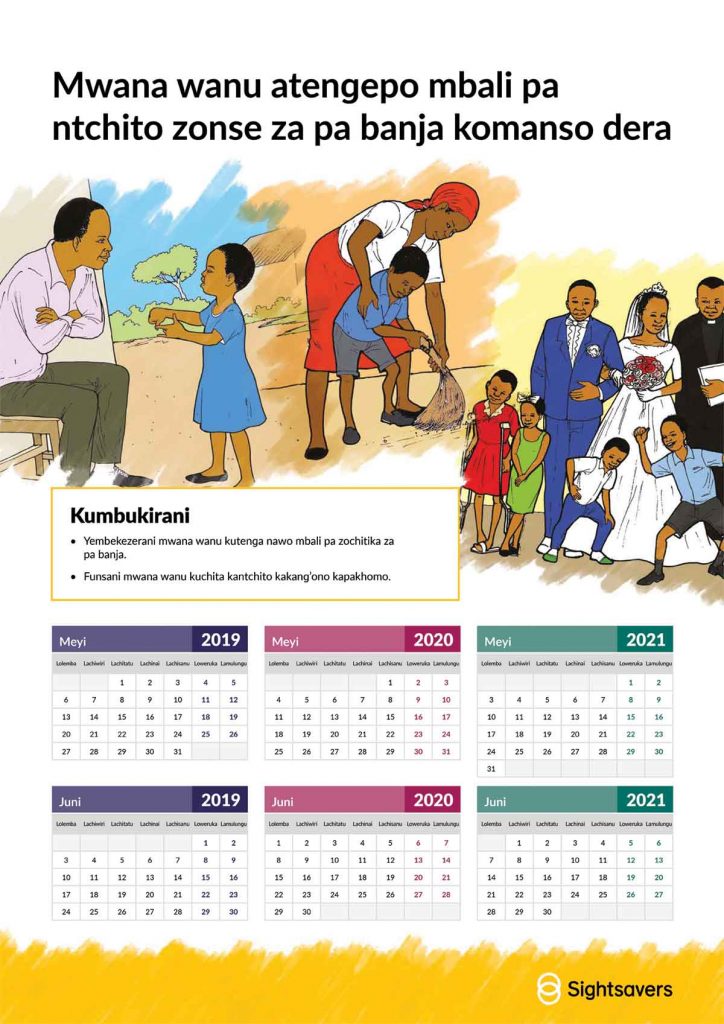Access to early childhood development and education (ECDE) is limited for children with disabilities in Malawi for many reasons, including negative social attitudes, inaccessible learning environments, and a lack of investment. In 2016, Sightsavers, a UK-based non-governmental organisation, launched a project in the Ntcheu and Chikwawa districts of Malawi to promote disability inclusion in ECDE programmes. This was funded by Comic Relief and delivered in partnership with the Federation of Disability Organisations in Malawi (FEDOMA), the Catholic Health Commission (CHC) and the Centre for Children’s Affairs (CCA). Veronica outlines the project in this article.
Community-based childcare centres
In Malawi, early childhood education is delivered through a network of community-based childcare centres (CBCCs) which are established, funded and run by local communities. The CBCCs are open for children aged 3-6 years. They provide a foundation in early childhood education before progression to the local primary school. We supported 20 existing CBCCs, working with local communities and volunteer pre-school teachers known as caregivers. The caregivers have limited access to training but do a great job in challenging circumstances.
Our project focused on enabling children with disabilities to attend the CBCCs. We supported their families and local community members through training, mentoring and guidance on how to make CBCCs more accessible for young children with disabilities. By the end of the project, 179 children were able to attend their local CBCC and make the vital first step into formal education.
From meetings to calendars
As part of our approach, we conducted regular meetings in four clusters of villages about disability, inclusion and the value of all children with disabilities attending the CBCCs. The meetings were well attended. We saw positive changes in the centres and increased enrolment of children with disabilities. However, not everyone was able to attend and those who did could quickly forget the messages in their busy lives.
We began to explore ways to disseminate information after the events to help keep it in parents’ minds. We developed calendars that contained key messages about inclusive ECDE to enhance the capacity of a range of stakeholders to support children with disabilities. Calendars were ideal as most households in the area have one hanging on the wall and it is common practice for larger businesses to provide them free to customers.
The calendars were designed to last for three years and each page contained simple messages about supporting young children with disabilities. They were written in the local language, Chichewa, and a local artist completed the illustrations. The calendars were the focal point of the meetings (two were held in each village cluster).
Participants looked at the illustrations in groups, discussed what they meant, and shared their learning with the whole group. The meetings lasted 2-3 hours, demonstrating a high level of commitment from the local communities. Over 300 people attended during a six-month period.
We printed two versions of the calendar: one for parents and families, and one for caregivers.
The caregivers’ calendar was linked to the school year and based around the National Syllabus for Integrated Early Childhood Development. For example, September/October covers Language, Literature and Communication, one of six domains contained in the ECDE syllabus. Each page contains a simple message and 2-3 points to remember.
September / October
‘Communicate with the children and encourage them to communicate with you’
– Speak clearly in short, simple sentences.
– Use gestures and facial expressions to communicate meaning.
– Use the child’s name to get their attention and ask questions to test their understanding.
In the parents’ calendar, each page presents one key message and two things to remember. The messages are supported with positive illustrations to help parents understand the message and think of ideas to put it into practice.
May / June
‘Include your child with disabilities in all family and community activities’
– Expect your child to take part in all family activities.
– Ask your child to complete simple household chores.

Did the messages have an impact?
We wanted to ensure that the calendars were useful in supporting children, not just another picture on the wall. In addition to focusing on them during the meetings, caregivers were trained in the key messages and links to the syllabus.
There were children with disabilities who could not regularly attend the centres. They were supported at home by Health Surveillance Assistants (HSAs) as part of the home-based care strand of the project. We encouraged the HSAs to discuss the calendar messages with parents during home visits.
During regular monitoring and support visits over a six-month period, we noted that:
- All observed caregivers were able to explain at least 2 key messages from the materials.
- All trained caregivers could apply at least one key message from the calendars in their teaching
- All interviewed parents of children receiving home-based care (27) and all parents of children with disabilities who attended the CBCC (108) could explain at least 2 key messages.
This was not in-depth research and we do not know yet whether the messages will have a long-term impact, but we do know parents and caregivers learned from the calendars. More importantly, they were a resource around which discussions could be focused to ensure that the needs of children with disabilities were remembered. Parents reported that they liked the pictures, understood the messages, and were happy to display the calendars in their homes.
Conclusion
We have found the calendars to be a valuable resource to raise awareness of children with disabilities and their rights to education and having their needs met. They are only one tool of the many that we use in our projects, but they can easily be produced and are more likely to be kept and displayed in the home than leaflets or pamphlets. We have since reviewed and updated the calendars for use elsewhere in Malawi to encourage the inclusion of children with disabilities in education.
Contact: Veronica is Global Technical Lead for Education (East, Central and Southern Africa) at SightSavers. Email: vstapleton@sightsavers.org.
